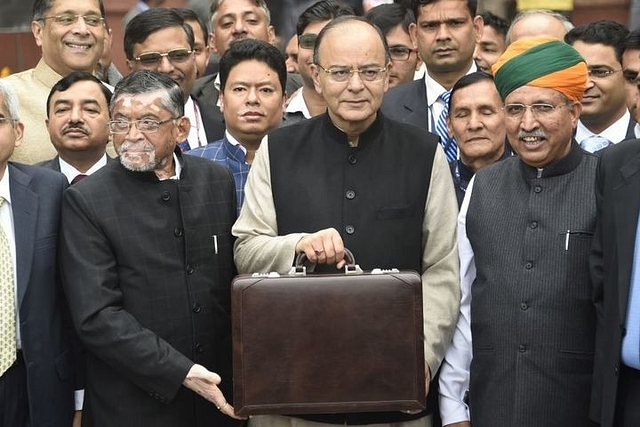
The Case For NDA’s Sixth Regular Budget In Five Years, Or A Mini-Budget In The Winter Session
The case for a mini-budget stands strong if a regular budget is not possible in January 2019.
Elections or no elections, the economy’s problems need proper attention.
It is interesting that nobody is yet talking about it. The National Democratic Alliance (NDA) government should – in theory – be able to present an unprecedented sixth full budget by end-January 2019, since that will give it a month to get it passed before the schedule for the general elections is announced in early March. In 2014, election dates were announced on 5 March, and the model code of conduct kicked in from that date.
Since the NDA has already moved back the budget presentation date to late-January-early February (it was 31 January in 2017 and 1 February this year), it should be able to present a normal budget – and not just an interim one – for 2019-20. However, there is no gainsaying the fact that the opposition will make this an issue, and the Election Commission will be under pressure to direct the government to present only an interim budget for 2019-20.
This would be tragic for the Indian economy, for the country cannot forever be run on the assumption that whenever there is an election around the corner, normal governance and budgetary activity must cease. We are unfortunately on a perpetual election cycle, and since no one is buying Narendra Modi’s one-nation-one-poll idea, the least we can do is to stop putting roadblocks to governance on the pretext of elections. In 2017, when Uttar Pradesh elections were due, the opposition’s efforts to force the government to present only an interim budget failed. The same should happen this time too.
To be doubly sure that the next budget is not disrupted, the NDA government would be prudent to prepare for a mini-budget soon after the state assembly elections to five states – Madhya Pradesh, Chhattisgarh, Rajasthan, Telangana and Mizoram – are completed and results announced on 11 December.
The winter session of Parliament should thus be used for announcing a mini-budget, unless there is general agreement that a regular budget can be presented on 31 January and passed by end-February before the Election Commission announces its Lok Sabha election dates.
Unlike a regular budget, where all taxation and expenditure issues are addressed, a mini-budget could focus only on the tax and duty changes that need urgent attention, apart from presenting an expenditure forecast.
In a sense, this is already happening, with goods and services tax (GST) rates being tweaked regularly, and import duties being raised to combat the worsening current account deficit, and give domestic manufacturing a push.
In 2018, the Modi government has raised import tariffs at least four times – once in the Union budget last February, and again in June (when it announced retaliatory tariffs on agricultural products and steel in response to US President Donald Trump’s protectionist moves), followed by two hikes in July and August on hundreds of textile items, and the latest one (September-end) where basic customs duties have been raised on 19 items, including aviation fuel, that account for nearly Rs 86,000 crore in imports.
With the rupee on a downward course, most of these import tariff hikes can probably be rolled back, since a cheaper rupee gives domestic players enough protection. The rupee has slid nearly 13-14 per cent this year, and in terms of effective protection, this is as good as a tariff hike. Bringing import duties somewhere near where they were earlier will give growth a fillip.
The second area that needs attention is corporate taxes. The promise made in the 2015 budget, that taxes will be cut to 25 per cent, has been implemented only in part, with the largest companies being left out. In his 2018-19 budget, Finance Minister Arun Jaitley gave this tax cut only for companies with a turnover upto Rs 250 crore. Extending the tax cut to all companies will give the stock market a positive push, a push that is vital for ensuring that the disinvestment target can be met. If the market continues tanking, the budget deficit will rise as disinvestment proceeds could be well short of the target of Rs 80,000 crore.
Third, given the weakness in the non-bank financial sector following the loan defaults involving Infrastructure Leasing & Financial Services (IL&FS), the budget could choose to announce some plan of action on this front. This can be done outside the budget too, but a provision for supporting too-big-to-fail financial companies, and schemes to facilitate more financial sector mergers, can have a policy tint if presented within the budget.
Fourth, some measure of tax relief to the middle class is also warranted, not only from the electoral mood point of view, but also because this segment has faced shocks due to weak jobs and incomes growth since 2016.
Fifth, major provisions may have to be made for shifts in oil-related tax revenues, especially due to rising oil prices and the excise cuts announced a few days ago.
Sixth, a scheme to provide for differentiated voting powers for promoters of Indian tech and e-commerce start-ups is needed as of yesterday. Without this proviso, Indian entrepreneurs will be forced to sell their stakes to foreign companies with loads of easy capital at their command. The sale of Flipkart to Wal-Mart should be a wake-up call. The budget is the best place to announce support for Indian entrepreneurship.
There are many other issues that only a full-fledged budget can deal with, but the case for a mini-budget stands strong if a regular budget is not possible in January 2019.
Elections or no elections, the economy’s problems need proper attention.